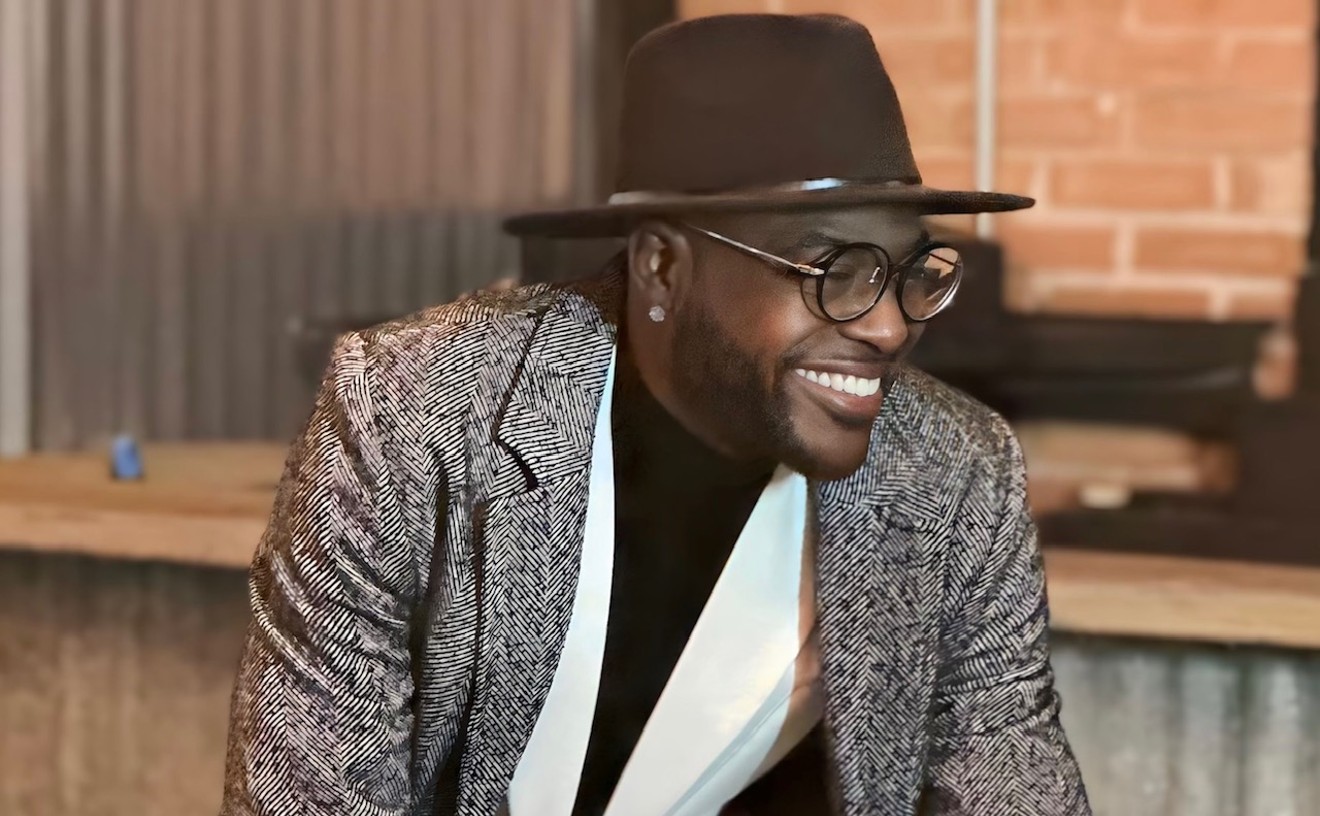The most moving of three musicals that have just opened on Dallas stages is the little one with no orchestra, only two characters and a collection of songs, performed mostly a cappella, that never won a single Tony. It's Black Pearl Sings!, now playing at Addison's WaterTower Theatre. More than the two Broadway powerhouses, Wicked and Avenue Q, whose touring companies are in town at rival venues, this simple but powerful play-with-music resonates on a higher plane, spiritually and dramatically. It also has Liz Mikel in the title role. That is the single best reason to recommend it.
Mikel, a member of Dallas Theater Center's resident acting company, has had a busy year. She was Titania, the diva fairy queen, in DTC's season opener, A Midsummer Night's Dream. In the raunchy world premiere musical Give It Up!, she played a comic hooker, but really seemed to be there just to give the weak-melodied songs some vocal heft. In DTC's recent Death of a Salesman, a rare non-musical production for Mikel, she appeared as Willy Loman's "other woman."
In Black Pearl Sings!, she gets the best role she's had in years—and it's interesting that it's WaterTower director Terry Martin giving her the plum and not her home company at the Wyly Theatre downtown. In this show, set in the 1930s, Mikel is Alberta "Pearl" Johnson, a Gullah woman imprisoned for a decade for performing Lorena Bobbit-like justice on a no-good boyfriend. Pearl becomes a subject of research by ambitious Library of Congress musicologist Susannah Mullally, played by Diana Sheehan (star of WaterTower's Grey Gardens) with a touch of Miss Jane Hathaway primness. Hoping to advance her career by finding women who know nearly forgotten black folk songs from "before slavery times," Mullally visits prisons throughout the Deep South. She discovers Pearl in a hellhole lockup in East Texas, where the women spend their days clearing leech-infested swampland to be developed into a golf course.
Dragging an iron ball on a chain cuffed to her ankle, Mikel plays Pearl with an authentic, bone-deep weariness. Told by Susannah that she's there to help her, Pearl reacts with a heavy sigh. "I don't need another white woman in a girdle tryin' to tell me 'bout Gawd," she says.
But it isn't religion Susannah offers Pearl; it's freedom. If Pearl will let Susannah record her singing some of the old songs she learned from her mother and grandmother (both slaves), she'll petition the governor for an early parole. Pearl counter-bargains. If she sings for the white lady, she wants help finding the adult daughter she's lost track of.
Deal done, Pearl gets out of jail and performs as ordered. And when she does, the brittle structure of Frank Higgins' two-act script fades away. Every time Black Pearl Sings! stops talking and lets Liz Mikel light into "Do Lord" and other folk and gospel tunes, it becomes as lush and lavish as an opera. Here is a voice that roars like thunder or trills like a flute. Stomping her bare foot on the wood-plank floor or clapping her hands for percussion, Mikel sings every song with prayer-like fervor. She's so magnificent, any accompaniment by piano or drums would seem like an intrusion on something pure.
The second act ties things up a bit too neatly. Susannah takes Pearl on a concert tour, starting in New York City, where academics flock to hear her but critics compare her to a sideshow act like King Kong. When Susannah suggests that Pearl perform in prison stripes for "authenticity," the women clash. But not for long. News of a family tragedy binds them closer than ever.
In the final moments, alone onstage, Pearl sings one last simple song. Mikel, tears streaming down her cheeks, has never looked or sounded more beautiful.
<\hr>Yes, Wicked and Avenue Q are here. Wicked for the third go-round; Avenue Q for its first time in Dallas (it's been at Fort Worth's Bass Hall twice). If you've never seen either, you won't be disappointed by these touring casts. If you caught Wicked in its previous visits, however, you've seen better than the one now at the Music Hall at Fair Park. In this cast, it's the supporting players who have all the juice. Jane Houdyshell, a Tony-nominated Broadway actress, is the funniest, best Madame Morrible (the Wizard's assistant) of all the tours (she alternates with Randy Danson, another great New York character actress). Richard Kline, known to rerun watchers as Jack Tripper's wingman Larry on Three's Company, pops up as the Wonderful Wizard, proving to be a charming singer and dancer. (Someone sitting nearby whispered "Is that Gopher from Love Boat?" Close enough.)
Telling the backstory of how Glinda the Good Witch and Elphaba, the Wicked Witch of the West, became frenemies, Wicked still looks expensive and fresh. The huge gear-turning, Oz-green Tony-winning sets by Eugene Lee and costumes by Susan Hilferty are eye-poppers. The pit band conducted by P. Jason Yarcho, half traveling orchestra and half local hires, is as sharp as ever.
It's the witches, played by Chandra Lee Schwartz (Glinda) and Donna Vivino (Elphaba), who disappoint. They lack that magical oomph, seeming smaller vocally and physically compared to tour predecessors. Schwartz has none of the squeaky cuteness of Kristin Chenoweth's original take on the part. This Glinda might be more at home in Legally Blonde. And nobody can top Stephanie J. Block's Elphaba. In the first Wicked here in 2005, her "Defying Gravity," the high-flying act one closer, brought the audience to its feet before intermission. Vivino's good, but not that good.
<\hr>Avenue Q is the show that stole the 2004 Tony Awards for best score (by Robert Lopez and Jeff Marx) and best book of a musical (Jeff Whitty) from Wicked. The non-Equity tour now at the Winspear Opera House stars an adorable cast of young actor/puppeteers: Brent Michael DiRoma, Tim Kornblum, Jacqueline Grabois, Michael Liscio Jr., Lisa Helmi Johanson, Nigel Jamaal Clark and Kerri Brackin.
Mixing puppets and people flawlessly, this hard-R-rated take on Sesame Street asks questions about how to find one's "purpose" in a world wracked with racism, homophobia and poverty. The songs are witty and the jokes are dirty. They've even found a way to work around the sudden death of TV star Gary Coleman, who "appears" in Avenue Q as a building super in overalls and tool belt. The character gets a big laugh in the song "It Sucks to Be Me." And now, like, yeah, it really does.
Do not take children to Avenue Q. These puppets get drunk and fuck. The material is unapologetically rude. And if it offends some of the stuffed shirts who can afford the $100 tickets at the Winspear, then the show has fulfilled its purpose.










